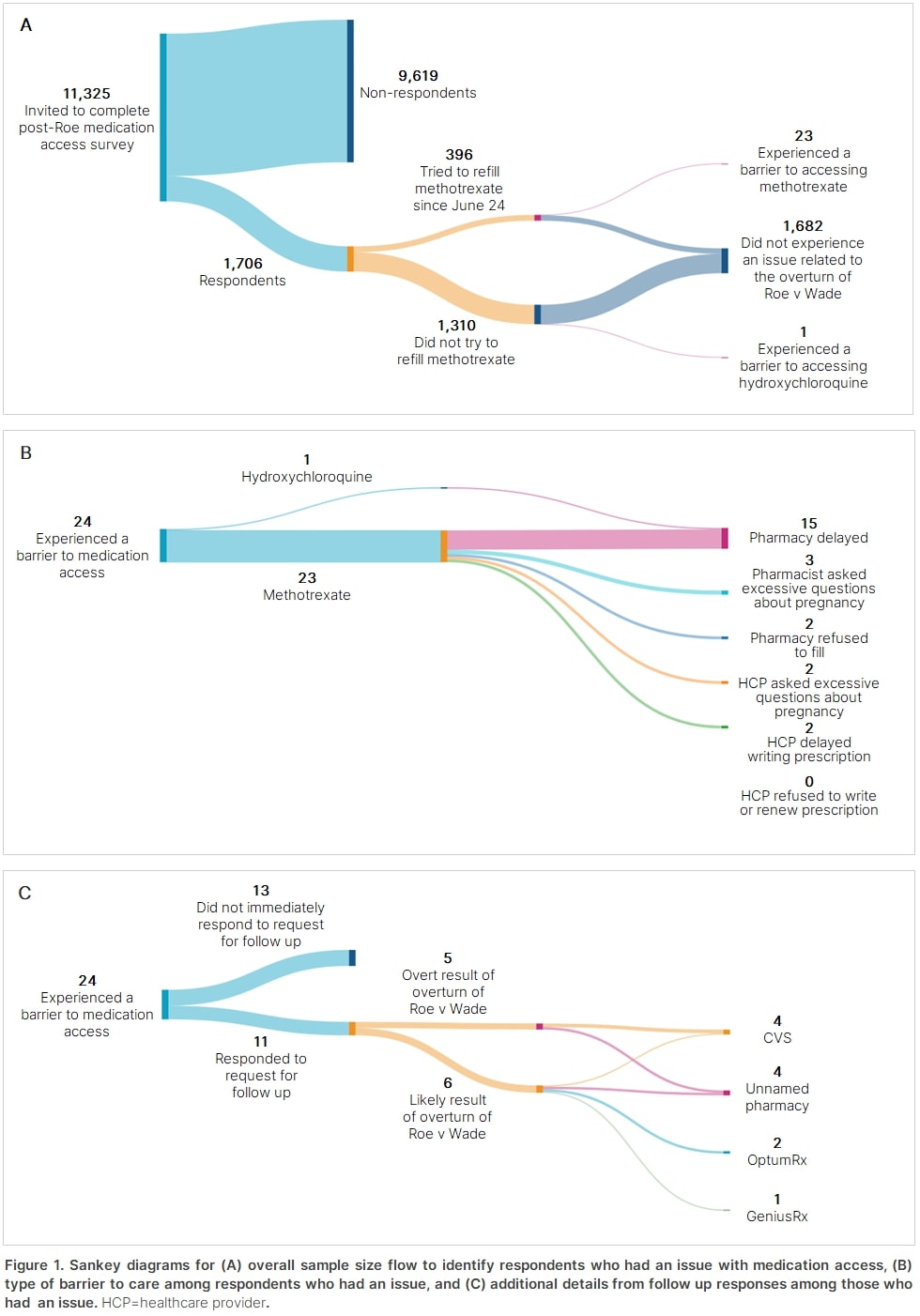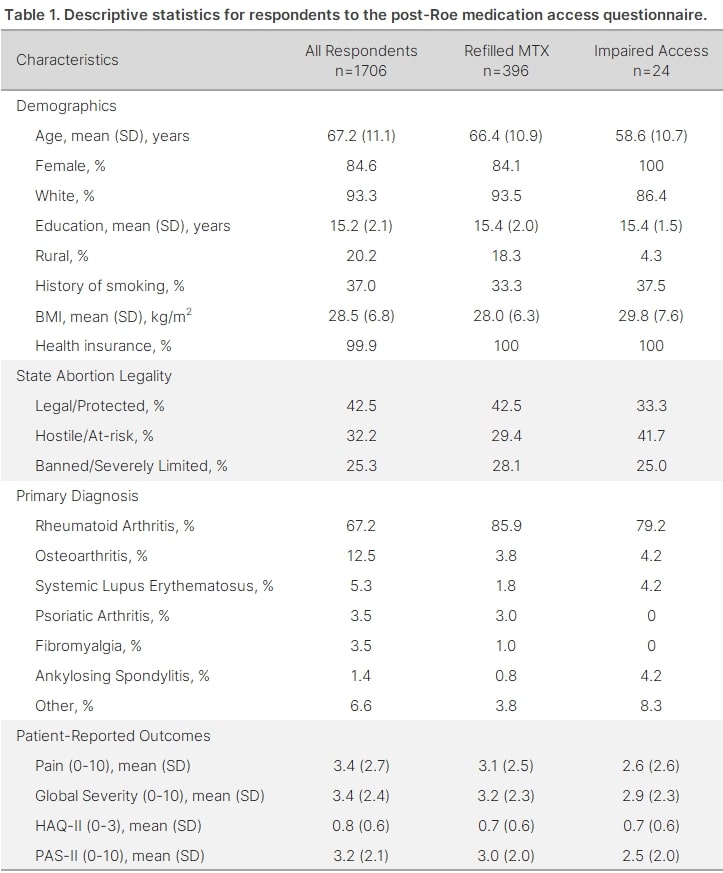Back
Poster Session D
Session: (L07–L17) Late-Breaking Abstract Poster
L09: Impact on Access to Methotrexate in the Post-Roe Era
Monday, November 14, 2022
1:00 PM – 3:00 PM Eastern Time
Location: Virtual Poster Hall

Kristin Wipfler, PhD
FORWARD, The National Databank for Rheumatic Diseases
Omaha, NE, United StatesDisclosure: Disclosure information not submitted.
Late-Breaking Poster Presenter(s)
Kristin Wipfler1, Adam Cornish1, Rebecca Schumacher2, Yomei Shaw3, Patricia Katz4 and Kaleb Michaud5, 1FORWARD, The National Databank for Rheumatic Diseases, Omaha, NE, 2FORWARD, The National Databank for Rheumatic Diseases, Wichita, KS, 3FORWARD, The National Databank for Rheumatic Diseases, Santa Fe, NM, 4UCSF, San Rafael, CA, 5University of Nebraska Medical Center, Omaha, NE
Background/Purpose: Methotrexate is the first line therapy for RA and is used to treat several other rheumatic and non-rheumatic disorders. In high doses, it can be used to treat miscarriage and ectopic pregnancy. Following the US Supreme Court's June 24 decision to overturn Roe v Wade, many states have enacted laws that ban or restrict abortion. As a result, some patients have reported difficulty filling their methotrexate prescriptions to treat their arthritis, but the scope and severity of this issue is unknown. The objective of this study was to assess the impact of this decision on individuals with rheumatic diseases and their access to care.
Methods: Data were provided by adults participating in FORWARD, The National Databank for Rheumatic Diseases who completed a survey about post-Roe medication access. Participants were provided a description of the Supreme Court decision and were asked if they experienced any issues accessing medication since June 24 (response options are shown in Figure 1B). Respondents were also asked if they had attempted to refill methotrexate since June 24 and what medication was affected if they experienced an issue. Responses were linked to participants' most recent semiannual questionnaire for demographics, primary diagnosis, and patient-reported outcomes. Participants' states of residence were categorized by abortion legality status.
Results: Of 1,706 respondents, 396 reported attempting to fill a methotrexate prescription since June 24. Of those, 23 (6%) reported experiencing a barrier to methotrexate access. One additional respondent reported restricted access to hydroxychloroquine (Figure 1A). Descriptive statistics are presented in Table 1. Most (63%) respondents who reported an issue indicated they experienced a delay in prescription refilling by their pharmacy (Figure 1B). Of the 24 who experienced a problem, 11 responded to a request for follow up to provide additional information. Of those, 5 experienced barriers that were overtly a result of the Supreme Court's decision (respondents reported being told directly that the issue was due to pregnancy risk/concerns related to abortion) and 6 experienced barriers suggestive of being a consequence of the decision (respondents reported unexpected delays/refusals without being given a clear explanation or reasoning; Figure 1C).
Conclusion: Within two months of the Supreme Court's overturn of Roe v Wade, 1 in 17 individuals who tried to fill a methotrexate prescription experienced an unexpected barrier. Respondents to this survey were predominantly white, older than child-bearing age, educated, and insured; the impact in higher risk populations may be more severe. Most issues experienced were delays by pharmacies seeking to confirm the purpose of the prescription with the patient's health care provider. To reduce or avoid these delays, we recommend that health care providers prescribing methotrexate or other medications that are teratogenic or abortifacient include the patient's diagnosis on the prescription.


Disclosures: K. Wipfler, None; A. Cornish, None; R. Schumacher, None; Y. Shaw, None; P. Katz, None; K. Michaud, None.
Background/Purpose: Methotrexate is the first line therapy for RA and is used to treat several other rheumatic and non-rheumatic disorders. In high doses, it can be used to treat miscarriage and ectopic pregnancy. Following the US Supreme Court's June 24 decision to overturn Roe v Wade, many states have enacted laws that ban or restrict abortion. As a result, some patients have reported difficulty filling their methotrexate prescriptions to treat their arthritis, but the scope and severity of this issue is unknown. The objective of this study was to assess the impact of this decision on individuals with rheumatic diseases and their access to care.
Methods: Data were provided by adults participating in FORWARD, The National Databank for Rheumatic Diseases who completed a survey about post-Roe medication access. Participants were provided a description of the Supreme Court decision and were asked if they experienced any issues accessing medication since June 24 (response options are shown in Figure 1B). Respondents were also asked if they had attempted to refill methotrexate since June 24 and what medication was affected if they experienced an issue. Responses were linked to participants' most recent semiannual questionnaire for demographics, primary diagnosis, and patient-reported outcomes. Participants' states of residence were categorized by abortion legality status.
Results: Of 1,706 respondents, 396 reported attempting to fill a methotrexate prescription since June 24. Of those, 23 (6%) reported experiencing a barrier to methotrexate access. One additional respondent reported restricted access to hydroxychloroquine (Figure 1A). Descriptive statistics are presented in Table 1. Most (63%) respondents who reported an issue indicated they experienced a delay in prescription refilling by their pharmacy (Figure 1B). Of the 24 who experienced a problem, 11 responded to a request for follow up to provide additional information. Of those, 5 experienced barriers that were overtly a result of the Supreme Court's decision (respondents reported being told directly that the issue was due to pregnancy risk/concerns related to abortion) and 6 experienced barriers suggestive of being a consequence of the decision (respondents reported unexpected delays/refusals without being given a clear explanation or reasoning; Figure 1C).
Conclusion: Within two months of the Supreme Court's overturn of Roe v Wade, 1 in 17 individuals who tried to fill a methotrexate prescription experienced an unexpected barrier. Respondents to this survey were predominantly white, older than child-bearing age, educated, and insured; the impact in higher risk populations may be more severe. Most issues experienced were delays by pharmacies seeking to confirm the purpose of the prescription with the patient's health care provider. To reduce or avoid these delays, we recommend that health care providers prescribing methotrexate or other medications that are teratogenic or abortifacient include the patient's diagnosis on the prescription.


Disclosures: K. Wipfler, None; A. Cornish, None; R. Schumacher, None; Y. Shaw, None; P. Katz, None; K. Michaud, None.

